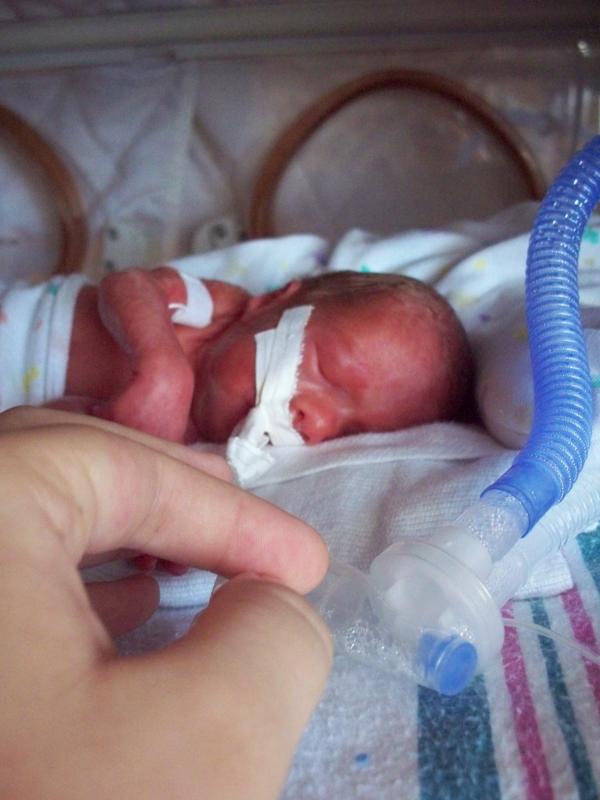
Photo posted by Chris Sternal-Johnson here
NICU is the abbreviation for neonatal intensive care unit. It is for new born infants who need serious medical attention.
The first time I heard about NICUs was a little before Women's Web asked me to do an article on availability of NICU beds in India. Just a month before that, the lady who baby sat my kids, Kanta (name changed) for an hour a day, went in to preterm labor at 7 months of pregnancy, and her baby was kept in a NICU for over a month.
NICUs are usually required for babies who have been prematurely born, or if there was some complication during the delivery, or if the baby falls seriously ill soon after birth.
While some parents who are expecting twins (multiples), or have conceived through IVF, or are aware of complications in their pregnancy like chronic kidney disease, hypertension or gestational diabetes, are likely to be aware of the possibility of preterm labor, it can happen for other reasons like urinary tract infections or stressful life events.
For couples who are at risk for preterm labor, as much as it is not something you want to think about, it is better to research nearby medical facilities providing different levels of neonatal care and prepare financially, emotionally and practically, (arranging for family support, or a nanny or seeking help from friends and neighbors for older siblings who may need care) as far as possible for various eventualities.
What care does a NICU provide?
A new born is evaluated based on its appearance, pulse, reflex, activity and respiration by a measure called an APGAR score. Depending on the APGAR score, a neonatal in distress requires different levels of care to help it survive, and neonatal care facilities are classified accordingly. I have summarized the information in this link.
Level 1 for basic neonatal care
This is a basic facility that can provide care for babies born before 34 weeks and weighing between 1.5 to 2 Kgs. It can handle neonatal resuscitation at every delivery. They can also stabilize and provide care for full term infants who require respiratory support, or have problems with blood flow or circulation. It deals with babies having an APGAR score around 6.
Level 2 for special neonatal care
These facilities can care for infants born after 30 weeks and weighing a little less than 1.5 KG, with an APGAR score of 4 to 6. They can provide support for infants who have trouble with oral feeding, or are unable to maintain their body temperature, or are ill but are not likely to need to urgent intensive care.
There are two sub levels in level two special care units, depending on whether or not they are equipped to provide short term mechanical ventilation and continuous positive airway pressure.
Level 3 NICU for intensive care
Here there are 3 sub categories.
A level 3A NICU is equipped provide care for babies born after 28 weeks and weighing over 1 Kg with APGAR score around 3 or just below. They can provide sustained life support with a mechanical ventilator and perform some minor surgical procedures.
A level 3B facility is required for dealing with babies born before 28 weeks and weighing under 1 Kg. They are equipped to provide advanced respiratory support, advanced imaging and echocardiography. The facility also has a host of pediatric medical specialists on call at all times and pediatric surgical specialists available for complex surgeries that may be necessary.
A level 3C facility in addition can accommodate surgeries that require a cardiopulmonary bypass.
Here is a detailed post about what to expect at a NICU.
Although this gives you some useful information about NICUs, it doesn't really tell you what a NICU feels like. Here are some posts including first hand accounts by people who have had babies in the NICU to give you a feel for the emotions and struggles that parents experience: The reality Of The NICU, The NICU life, Life in the NICU
Losing a twin
One heartbreaking NICU story I heard through an acquaintance, was of a mom with twins who delivered in the 28th week. While one baby was in the NICU, the other died soon after birth. It is hard to imagine the emotional turmoil the parents experienced, putting off grieving for one baby, whilst trying to stay strong for the other.
Family and society
In India, although many of us have started staying in nuclear families we still often have strong ties to extended families and many couples still stay with, or close to, one set of parents at least. Family support can be a great source of comfort in dealing with the NICU. Grandparents or aunts and uncles caring for older siblings, while parents focus on the baby in the NICU, can make life a little more bearable.
In India many of us live in housing societies or community housing, where people can often be interfering, gossip mongering and judgmental, but on the plus side there are also people in these housing societies one comes to rely upon in times of great need for emotional and domestic support. Such, almost family like friends in housing societies, can also make dealing with the NICU less stressful.
We need more affordable NICUs in India but it wont be easy
In India, though the infant mortality rate has dropped to 84 from 144 per 1000 live births over the last decade, neonatal deaths still account for about 50% of infant mortality. This article discusses the practicality of implementing extensive and expensive neonatal care in a developing country like India.
While level 1 and level 2 facilities can help save lives, expensive level 3 facilities are also needed. One of the causes of preterm labor is closely spaced pregnancies, and education about women's health and family planning programs can help with it. The article also explains why out of the box thinking will be required in setting up NICUs in deveoping countries where space, money and maintainence of imported equipment pose challenges.
NICUs are expensive, and affordable options like JJ hospital and KEM in Mumbai, though they provide excellent care, simply cant keep up with the rising demand.
The Surya hospital in Santacruz, Mumbai launched one of the the country's largest NICUs some time ago, though I don't know how affordable it is. This article suggests that sophisticated neonatal care is available only to affluent parents while there are still too few options for low income families.
My househelp Kanta had to put her baby in a private NICU since it was an emergency situation, and no beds were available in KEM, JJ and other such facilities. She was really lucky, a bed became available in JJ a few night later, and her baby was able to stay there for a month growing stronger. But just those few nights at a private facility, cost her several months of her family's income.
According to a paper in 2014 although the number of NICUs had grown exponentially there were several hiccups in their functioning that still needed to be dealt with.
This in an interesting article about the history of neonatal care with a section about the pioneer of neonatal care Pierre Budin.
I am thrilled to be participating of the A to Z blogging challenge 2018.
